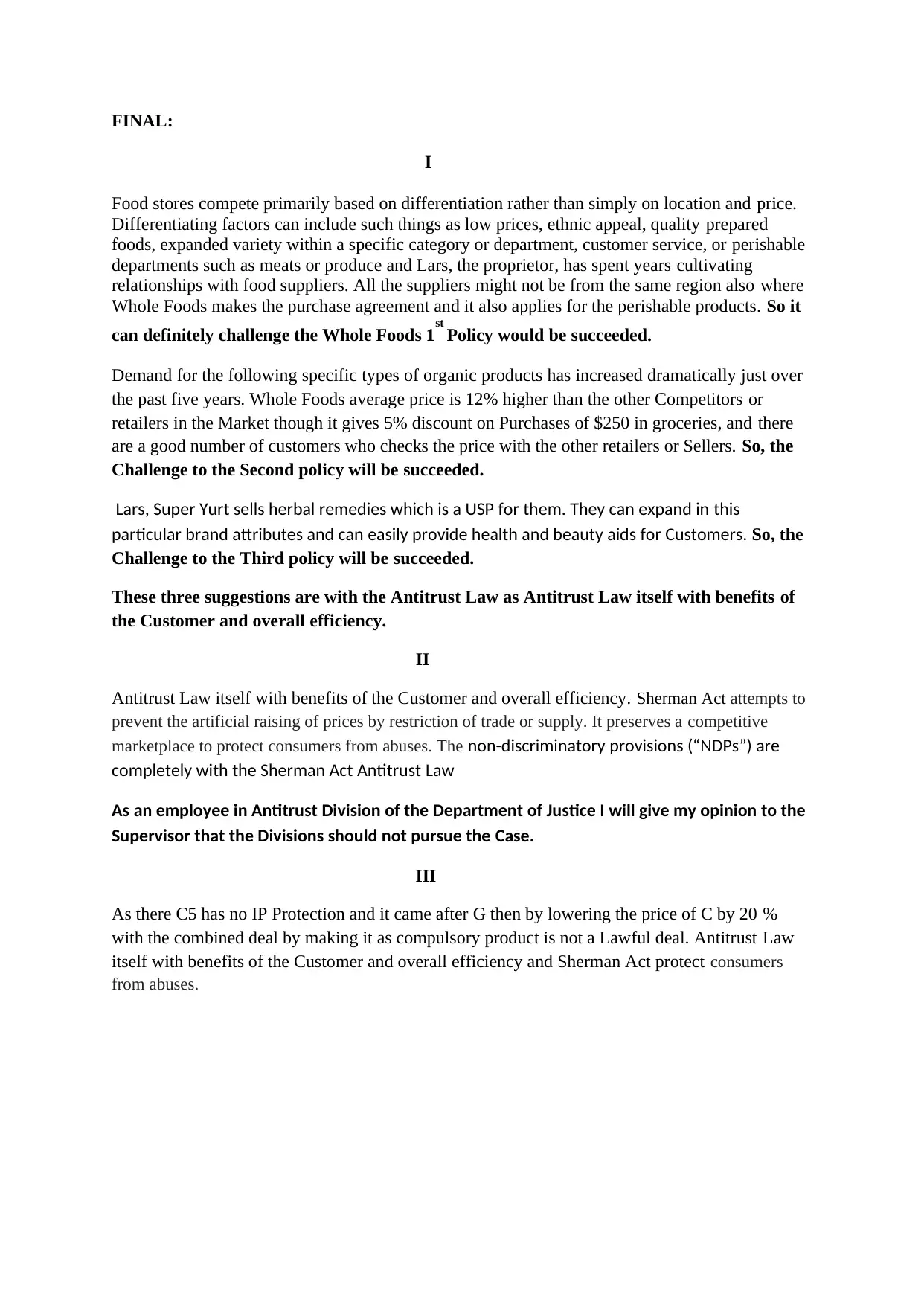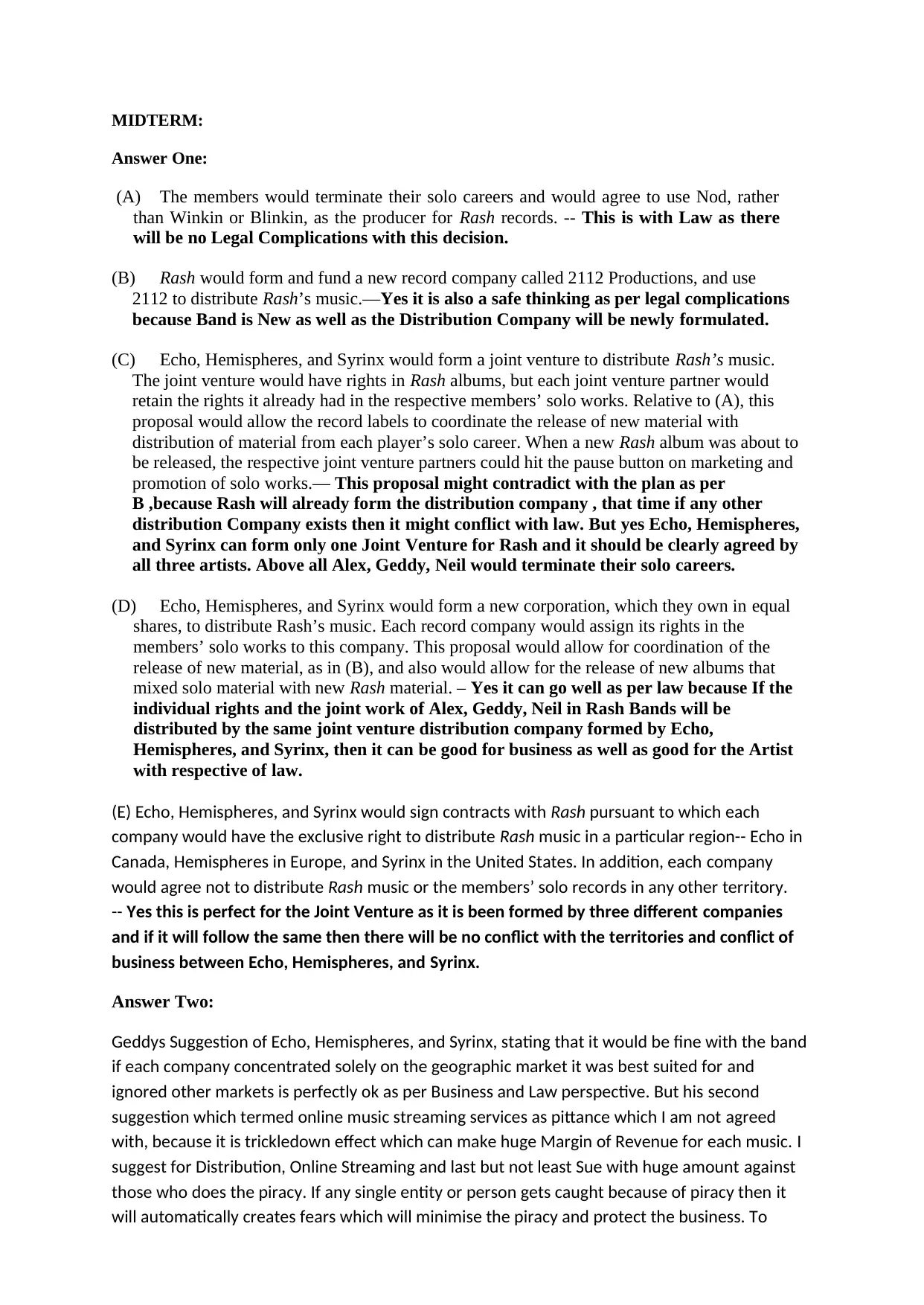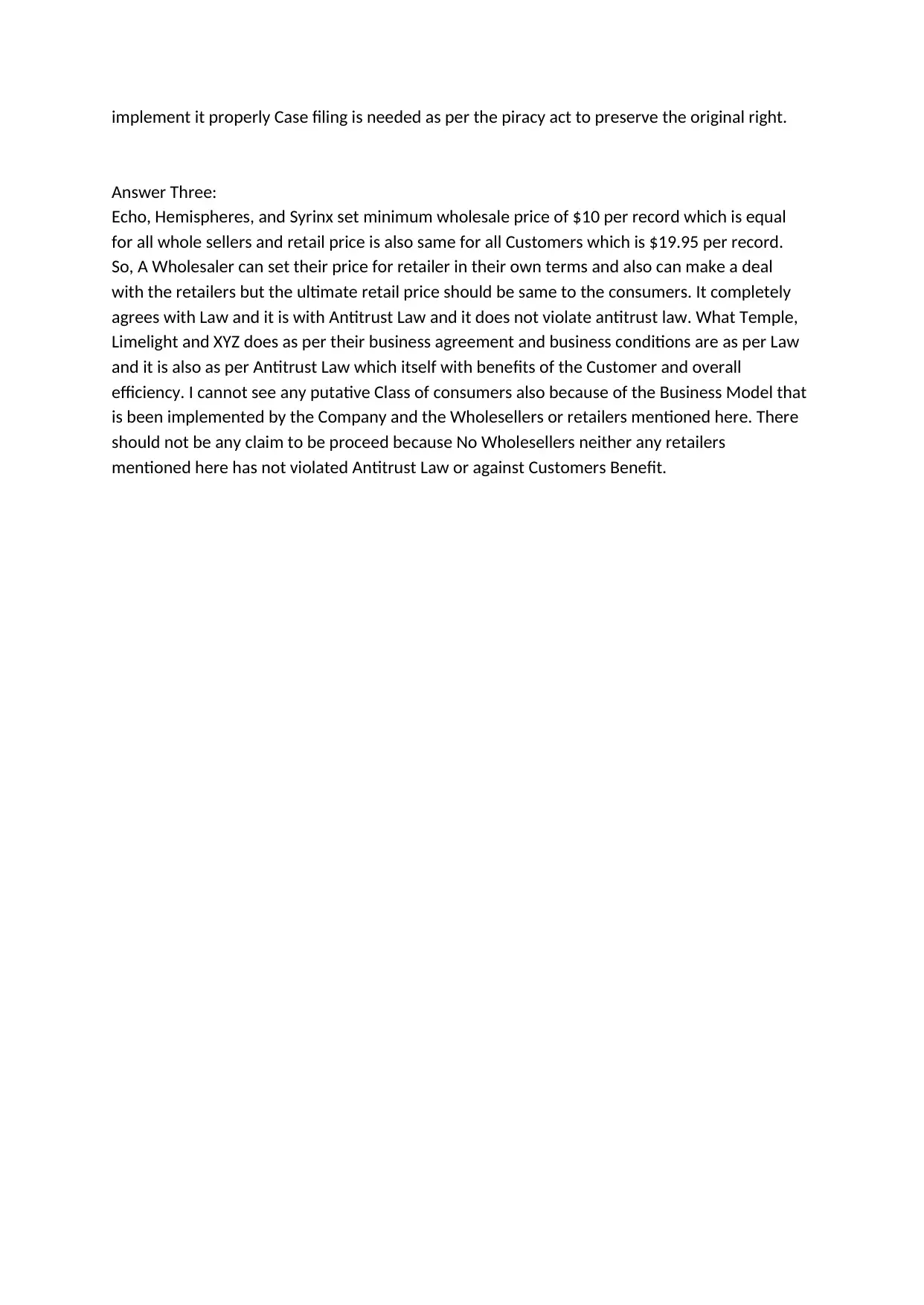Analysis of Antitrust Law in Business: I Food Stores and Rash Records
VerifiedAdded on 2019/09/23
|3
|1286
|192
Case Study
AI Summary
This case study delves into the application of antitrust law within the context of two distinct scenarios. The first part analyzes the competitive strategies of I Food Stores, examining their differentiation tactics and potential challenges related to antitrust regulations, particularly concerning pricing and supplier relationships. The analysis considers the impact of the Sherman Act on preventing artificial price increases and protecting consumers. The second part of the case study focuses on Rash Records and their business decisions, exploring various proposals for distribution and the legal implications of joint ventures, territorial agreements, and pricing strategies. The analysis evaluates the legality of different distribution models, including considerations of online streaming services, wholesale pricing, and the potential for antitrust violations. The document provides opinions on the legality of the decisions with respect to Antitrust law.

FINAL:
I
Food stores compete primarily based on differentiation rather than simply on location and price.
Differentiating factors can include such things as low prices, ethnic appeal, quality prepared
foods, expanded variety within a specific category or department, customer service, or perishable
departments such as meats or produce and Lars, the proprietor, has spent years cultivating
relationships with food suppliers. All the suppliers might not be from the same region also where
Whole Foods makes the purchase agreement and it also applies for the perishable products. So it
can definitely challenge the Whole Foods 1st
Policy would be succeeded.
Demand for the following specific types of organic products has increased dramatically just over
the past five years. Whole Foods average price is 12% higher than the other Competitors or
retailers in the Market though it gives 5% discount on Purchases of $250 in groceries, and there
are a good number of customers who checks the price with the other retailers or Sellers. So, the
Challenge to the Second policy will be succeeded.
Lars, Super Yurt sells herbal remedies which is a USP for them. They can expand in this
particular brand attributes and can easily provide health and beauty aids for Customers. So, the
Challenge to the Third policy will be succeeded.
These three suggestions are with the Antitrust Law as Antitrust Law itself with benefits of
the Customer and overall efficiency.
II
Antitrust Law itself with benefits of the Customer and overall efficiency. Sherman Act attempts to
prevent the artificial raising of prices by restriction of trade or supply. It preserves a competitive
marketplace to protect consumers from abuses. The non-discriminatory provisions (“NDPs”) are
completely with the Sherman Act Antitrust Law
As an employee in Antitrust Division of the Department of Justice I will give my opinion to the
Supervisor that the Divisions should not pursue the Case.
III
As there C5 has no IP Protection and it came after G then by lowering the price of C by 20 %
with the combined deal by making it as compulsory product is not a Lawful deal. Antitrust Law
itself with benefits of the Customer and overall efficiency and Sherman Act protect consumers
from abuses.
I
Food stores compete primarily based on differentiation rather than simply on location and price.
Differentiating factors can include such things as low prices, ethnic appeal, quality prepared
foods, expanded variety within a specific category or department, customer service, or perishable
departments such as meats or produce and Lars, the proprietor, has spent years cultivating
relationships with food suppliers. All the suppliers might not be from the same region also where
Whole Foods makes the purchase agreement and it also applies for the perishable products. So it
can definitely challenge the Whole Foods 1st
Policy would be succeeded.
Demand for the following specific types of organic products has increased dramatically just over
the past five years. Whole Foods average price is 12% higher than the other Competitors or
retailers in the Market though it gives 5% discount on Purchases of $250 in groceries, and there
are a good number of customers who checks the price with the other retailers or Sellers. So, the
Challenge to the Second policy will be succeeded.
Lars, Super Yurt sells herbal remedies which is a USP for them. They can expand in this
particular brand attributes and can easily provide health and beauty aids for Customers. So, the
Challenge to the Third policy will be succeeded.
These three suggestions are with the Antitrust Law as Antitrust Law itself with benefits of
the Customer and overall efficiency.
II
Antitrust Law itself with benefits of the Customer and overall efficiency. Sherman Act attempts to
prevent the artificial raising of prices by restriction of trade or supply. It preserves a competitive
marketplace to protect consumers from abuses. The non-discriminatory provisions (“NDPs”) are
completely with the Sherman Act Antitrust Law
As an employee in Antitrust Division of the Department of Justice I will give my opinion to the
Supervisor that the Divisions should not pursue the Case.
III
As there C5 has no IP Protection and it came after G then by lowering the price of C by 20 %
with the combined deal by making it as compulsory product is not a Lawful deal. Antitrust Law
itself with benefits of the Customer and overall efficiency and Sherman Act protect consumers
from abuses.
Paraphrase This Document
Need a fresh take? Get an instant paraphrase of this document with our AI Paraphraser

MIDTERM:
Answer One:
(A) The members would terminate their solo careers and would agree to use Nod, rather
than Winkin or Blinkin, as the producer for Rash records. -- This is with Law as there
will be no Legal Complications with this decision.
(B) Rash would form and fund a new record company called 2112 Productions, and use
2112 to distribute Rash’s music.—Yes it is also a safe thinking as per legal complications
because Band is New as well as the Distribution Company will be newly formulated.
(C) Echo, Hemispheres, and Syrinx would form a joint venture to distribute Rash’s music.
The joint venture would have rights in Rash albums, but each joint venture partner would
retain the rights it already had in the respective members’ solo works. Relative to (A), this
proposal would allow the record labels to coordinate the release of new material with
distribution of material from each player’s solo career. When a new Rash album was about to
be released, the respective joint venture partners could hit the pause button on marketing and
promotion of solo works.— This proposal might contradict with the plan as per
B ,because Rash will already form the distribution company , that time if any other
distribution Company exists then it might conflict with law. But yes Echo, Hemispheres,
and Syrinx can form only one Joint Venture for Rash and it should be clearly agreed by
all three artists. Above all Alex, Geddy, Neil would terminate their solo careers.
(D) Echo, Hemispheres, and Syrinx would form a new corporation, which they own in equal
shares, to distribute Rash’s music. Each record company would assign its rights in the
members’ solo works to this company. This proposal would allow for coordination of the
release of new material, as in (B), and also would allow for the release of new albums that
mixed solo material with new Rash material. – Yes it can go well as per law because If the
individual rights and the joint work of Alex, Geddy, Neil in Rash Bands will be
distributed by the same joint venture distribution company formed by Echo,
Hemispheres, and Syrinx, then it can be good for business as well as good for the Artist
with respective of law.
(E) Echo, Hemispheres, and Syrinx would sign contracts with Rash pursuant to which each
company would have the exclusive right to distribute Rash music in a particular region-- Echo in
Canada, Hemispheres in Europe, and Syrinx in the United States. In addition, each company
would agree not to distribute Rash music or the members’ solo records in any other territory.
-- Yes this is perfect for the Joint Venture as it is been formed by three different companies
and if it will follow the same then there will be no conflict with the territories and conflict of
business between Echo, Hemispheres, and Syrinx.
Answer Two:
Geddys Suggestion of Echo, Hemispheres, and Syrinx, stating that it would be fine with the band
if each company concentrated solely on the geographic market it was best suited for and
ignored other markets is perfectly ok as per Business and Law perspective. But his second
suggestion which termed online music streaming services as pittance which I am not agreed
with, because it is trickledown effect which can make huge Margin of Revenue for each music. I
suggest for Distribution, Online Streaming and last but not least Sue with huge amount against
those who does the piracy. If any single entity or person gets caught because of piracy then it
will automatically creates fears which will minimise the piracy and protect the business. To
Answer One:
(A) The members would terminate their solo careers and would agree to use Nod, rather
than Winkin or Blinkin, as the producer for Rash records. -- This is with Law as there
will be no Legal Complications with this decision.
(B) Rash would form and fund a new record company called 2112 Productions, and use
2112 to distribute Rash’s music.—Yes it is also a safe thinking as per legal complications
because Band is New as well as the Distribution Company will be newly formulated.
(C) Echo, Hemispheres, and Syrinx would form a joint venture to distribute Rash’s music.
The joint venture would have rights in Rash albums, but each joint venture partner would
retain the rights it already had in the respective members’ solo works. Relative to (A), this
proposal would allow the record labels to coordinate the release of new material with
distribution of material from each player’s solo career. When a new Rash album was about to
be released, the respective joint venture partners could hit the pause button on marketing and
promotion of solo works.— This proposal might contradict with the plan as per
B ,because Rash will already form the distribution company , that time if any other
distribution Company exists then it might conflict with law. But yes Echo, Hemispheres,
and Syrinx can form only one Joint Venture for Rash and it should be clearly agreed by
all three artists. Above all Alex, Geddy, Neil would terminate their solo careers.
(D) Echo, Hemispheres, and Syrinx would form a new corporation, which they own in equal
shares, to distribute Rash’s music. Each record company would assign its rights in the
members’ solo works to this company. This proposal would allow for coordination of the
release of new material, as in (B), and also would allow for the release of new albums that
mixed solo material with new Rash material. – Yes it can go well as per law because If the
individual rights and the joint work of Alex, Geddy, Neil in Rash Bands will be
distributed by the same joint venture distribution company formed by Echo,
Hemispheres, and Syrinx, then it can be good for business as well as good for the Artist
with respective of law.
(E) Echo, Hemispheres, and Syrinx would sign contracts with Rash pursuant to which each
company would have the exclusive right to distribute Rash music in a particular region-- Echo in
Canada, Hemispheres in Europe, and Syrinx in the United States. In addition, each company
would agree not to distribute Rash music or the members’ solo records in any other territory.
-- Yes this is perfect for the Joint Venture as it is been formed by three different companies
and if it will follow the same then there will be no conflict with the territories and conflict of
business between Echo, Hemispheres, and Syrinx.
Answer Two:
Geddys Suggestion of Echo, Hemispheres, and Syrinx, stating that it would be fine with the band
if each company concentrated solely on the geographic market it was best suited for and
ignored other markets is perfectly ok as per Business and Law perspective. But his second
suggestion which termed online music streaming services as pittance which I am not agreed
with, because it is trickledown effect which can make huge Margin of Revenue for each music. I
suggest for Distribution, Online Streaming and last but not least Sue with huge amount against
those who does the piracy. If any single entity or person gets caught because of piracy then it
will automatically creates fears which will minimise the piracy and protect the business. To

implement it properly Case filing is needed as per the piracy act to preserve the original right.
Answer Three:
Echo, Hemispheres, and Syrinx set minimum wholesale price of $10 per record which is equal
for all whole sellers and retail price is also same for all Customers which is $19.95 per record.
So, A Wholesaler can set their price for retailer in their own terms and also can make a deal
with the retailers but the ultimate retail price should be same to the consumers. It completely
agrees with Law and it is with Antitrust Law and it does not violate antitrust law. What Temple,
Limelight and XYZ does as per their business agreement and business conditions are as per Law
and it is also as per Antitrust Law which itself with benefits of the Customer and overall
efficiency. I cannot see any putative Class of consumers also because of the Business Model that
is been implemented by the Company and the Wholesellers or retailers mentioned here. There
should not be any claim to be proceed because No Wholesellers neither any retailers
mentioned here has not violated Antitrust Law or against Customers Benefit.
Answer Three:
Echo, Hemispheres, and Syrinx set minimum wholesale price of $10 per record which is equal
for all whole sellers and retail price is also same for all Customers which is $19.95 per record.
So, A Wholesaler can set their price for retailer in their own terms and also can make a deal
with the retailers but the ultimate retail price should be same to the consumers. It completely
agrees with Law and it is with Antitrust Law and it does not violate antitrust law. What Temple,
Limelight and XYZ does as per their business agreement and business conditions are as per Law
and it is also as per Antitrust Law which itself with benefits of the Customer and overall
efficiency. I cannot see any putative Class of consumers also because of the Business Model that
is been implemented by the Company and the Wholesellers or retailers mentioned here. There
should not be any claim to be proceed because No Wholesellers neither any retailers
mentioned here has not violated Antitrust Law or against Customers Benefit.
⊘ This is a preview!⊘
Do you want full access?
Subscribe today to unlock all pages.

Trusted by 1+ million students worldwide
1 out of 3
Your All-in-One AI-Powered Toolkit for Academic Success.
+13062052269
info@desklib.com
Available 24*7 on WhatsApp / Email
![[object Object]](/_next/static/media/star-bottom.7253800d.svg)
Unlock your academic potential
Copyright © 2020–2026 A2Z Services. All Rights Reserved. Developed and managed by ZUCOL.

